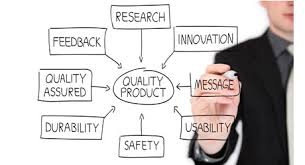
What makes a good product manager? Before looking at the 7 Core qualities of Good Product Manager, let’s understand who product manger is and what he does.
A product manager investigates, selects, and drives the development of products for an organization, performing the activities of product management.
 A product manager considers numerous factors such as intended demographic, the products offered by the competition, and how well the product fits with the company’s business model. Generally, a product manager manages one or more tangible products. However, the term may be used to describe a person who manages intangible products, such as information and services.
A product manager considers numerous factors such as intended demographic, the products offered by the competition, and how well the product fits with the company’s business model. Generally, a product manager manages one or more tangible products. However, the term may be used to describe a person who manages intangible products, such as information and services.
Building great products requires a broad skill set. We need to know how to explore a problem space, uncover unmet needs, design feasible solutions, and validate those solutions. We also need to be able to work with engineers, sales, management, and so many others. We need to develop technical proficiencies so that we have a firm grasp of what’s possible, allowing us to turn big ideas into actual products.
But is there a set of traits or skills that underlie all of these? Is there a set of skills that if we were to develop each one of them, would fuel our development in all of these other areas?
Here are the 7 Core qualities of Good Product Manager
1. Empathy
Oxford Dictionary defines empathy as the ability to understand and share the feelings of another.
More and more we are starting to understand the importance of empathy. It underlies so many skills related to product management.
It helps you understand the problem you are trying to solve. It helps you sell the idea to management, engineers, and sales. It helps you know which problems are big enough pain points to bother solving in the first place.
2. Active Listening
Like empathy, active listening is required to uncover unmet needs, to understand how to persuade and influence, and to really get to the root of an issue.
It’s easy for product to be ego-driven. But this will result in failure more often than not. To be a good product manager, you need to deliberately develop active listening skills so that your product becomes more about your users than about you.
3. Curiosity
It’s hard to be a genuine active listener without also being curious. A curious product manager will probe for more details, will ask clarifying questions, and will take the time to learn the ins-and-outs of his or her subject domain.
A curious product manager will research his or her audience, stay current on technology trends, and will keep an eye on the competition.
4. Experimenter’s Mindset / Intellectual Honesty
When developing products, it is so easy to convince ourselves that we are right. But the reality is, more often than not, we are going to be wrong.
It is critically important that we operate from the assumption that we are wrong and design experiments to tell us what truth is.
But an experimenter’s mindset is not enough.
We also need intellectual honesty to act on the results of our experiments. Too often, it’s easy to explain away our results. To look for the explanation that allows us to still be right. We need to develop the habit of intellectual honesty to trust our process and trust our results, even when we are wrong.
5. Basic Understanding of Statistics
It’s hard to know what’s true without a basic understanding of statistics. I’m no math whiz, but I know enough to know what meaningful data is and what should be ignored. Even if you run great experiments, if you don’t get the statistics right, you won’t learn anything meaningful.
6. Root Cause Analysis / High Rational IQ
Even with a well-defined experiment and great statistical analysis there are going to be many times when you have to dig deep to understand why you got the results that you did. Can you connect the dots?
Keith E. Stenovich introduces the concept of “rational intelligence” in his book What Intelligence Tests Miss: The Psychology of Rational Thought, a concept that seems to encompass judgment, critical thinking, and decision making.
Developing great products is nowhere near formulaic. More often than not you will have to proceed with incomplete data. You won’t always know why something happened. Keen critical thinking skills and the ability to get at the root cause are absolutely necessary.
7. Visual Communication
This one might be a surprise to some of you. I don’t mean the ability to draw well. I mean the ability to draw well enough to explore and / or communicate an idea.
Very often the act of sketching an idea opens up new possibilities. We’ve all experienced the flow of ideas in front of a whiteboard.
More importantly, we have all experienced the clarity that comes from drawing out an idea rather than trying to describe it. When it comes to product ideas, a picture truly is worth a thousand words.
Source: http://www.producttalk.org/2013/04/the-7-core-traits-of-a-good-product-manager/ , http://en.wikipedia.org/wiki/Product_Manager
